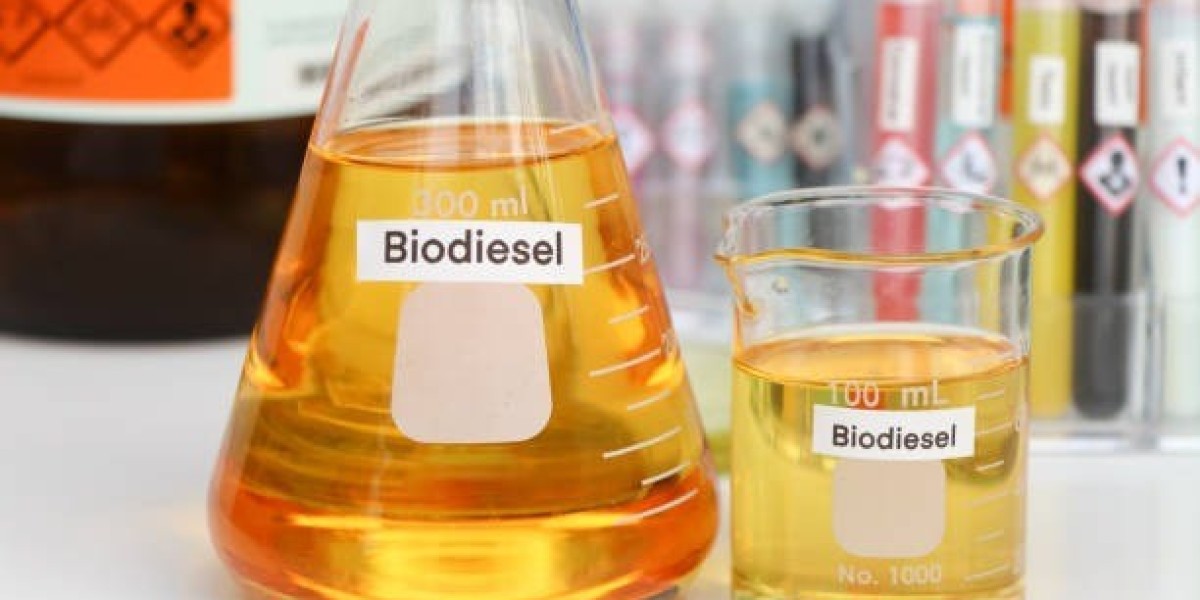Setting up a biodiesel manufacturing facility necessitates a detailed market analysis alongside granular insights into various operational aspects, including unit processes, raw material procurement, utility provisions, infrastructure setup, machinery and technology specifications, workforce planning, logistics, and financial considerations.
IMARC Group's report titled "Biodiesel Manufacturing Plant Project Report 2025: Industry Trends, Plant Setup, Machinery, Raw Materials, Investment Opportunities, Cost and Revenue" offers a comprehensive guide for establishing a biodiesel manufacturing plant, covering everything from product overview and production processes to detailed financial insights.
Request For Sample Report: https://www.imarcgroup.com/biodiesel-manufacturing-plant-project-report/requestsample
Biodiesel is a renewable, biodegradable fuel derived from vegetable oils, animal fats, or recycled cooking grease through a process called transesterification. It serves as an alternative to petroleum-based diesel and can be used in conventional diesel engines with minimal modifications. Biodiesel offers lower greenhouse gas emissions, reduced particulate matter, and improved lubricity, making it a sustainable option for transportation and industrial applications. It is commonly blended with petroleum diesel in varying ratios, such as B5, B20, and B100, to enhance fuel efficiency while reducing environmental impact. With the increasing global emphasis on energy security, carbon footprint reduction, and sustainable fuel alternatives, biodiesel has gained traction in sectors including automotive, marine, aviation, and power generation. Government mandates, subsidies, and incentives promoting biofuels are further accelerating its adoption, making biodiesel a crucial player in the global shift toward decarbonization and renewable energy solutions.
The biodiesel market is expanding due to stringent government policies and renewable energy mandates aimed at reducing fossil fuel dependency. The rising demand for sustainable aviation fuel (SAF) is driving increased biodiesel utilization in the aviation sector. Additionally, advancements in biodiesel production technology, such as enzyme-based catalysis and microbial fermentation, are improving fuel efficiency and reducing production costs. The agricultural sector’s increasing focus on energy crop cultivation, including soybean, rapeseed, and jatropha, is ensuring a steady feedstock supply for biodiesel production. Moreover, the growing role of circular economy initiatives, particularly the conversion of waste oils into biofuels, is enhancing resource utilization and reducing waste generation. The automotive industry's shift toward cleaner fuels is also propelling demand, as biodiesel can be integrated into existing diesel-powered vehicle fleets with minimal infrastructural modifications.
Besides this, the market is further driven by increasing investments in bio-refineries, ensuring large-scale biodiesel production with improved cost efficiency. The rise of public-private partnerships in biofuel research is fostering innovation in next-generation biodiesel formulations with higher energy density and lower emissions. The growing maritime industry’s transition to low-sulfur and carbon-neutral fuels is opening new opportunities for biodiesel adoption in shipping fleets. Additionally, the expansion of decentralized biodiesel production units, particularly in rural areas, is boosting energy self-sufficiency and economic development. The introduction of carbon credit and emission trading systems is incentivizing industries to adopt biofuels as a compliance measure. Furthermore, advancements in hybrid and dual-fuel engine technologies are facilitating seamless integration of biodiesel in diverse applications. The increasing consumer awareness regarding eco-friendly fuel alternatives and corporate sustainability commitments are also playing a crucial role in strengthening biodiesel demand across multiple industries.
Key Steps Required to Set Up a Biodiesel Plant
- Market Analysis
The report provides insights into the landscape of the biodiesel industry at the global level. The report also provides a segment-wise and region-wise breakup of the global biodiesel industry. Additionally, it also provides the price analysis of feedstocks used in the manufacturing of biodiesel, along with the industry profit margins.
- Segment Breakdown
- Regional Insights
- Pricing Analysis and Trends
- Market Forecast
- Product Manufacturing: Detailed Process Flow
Detailed information related to the process flow and various unit operations involved in the biodiesel manufacturing plant project is elaborated in the report. These include:
- Land, Location, and Site Development
- Plant Layout
- Plant Machinery
- Raw Material Procurement
- Packaging and Storage
- Transportation
- Quality Inspection
- Utilities
- Human Resource Requirements and Wages
- Marketing and Distribution
- Project Requirements and Cost
The report provides a detailed location analysis covering insights into the plant location, selection criteria, location significance, environmental impact, and expenditure for biodiesel manufacturing plant setup. Additionally, the report also provides information related to plant layout and factors influencing the same. Furthermore, other requirements and expenditures related to machinery, raw materials, packaging, transportation, utilities, and human resources have also been covered in the report.
Machinery and Equipment
- List of machinery needed for biodiesel production
- Estimated costs and suppliers
Raw Material Costs
- Types of materials required and sourcing strategies
Utilities and Overheads
- Electricity, water, labor, and other operational expenses
- Project Economics
A detailed analysis of the project economics for setting up a biodiesel manufacturing plant is illustrated in the report. This includes the analysis and detailed understanding of capital expenditure (CAPEX), operating expenditure (OPEX), income projections, taxation, depreciation, liquidity analysis, profitability analysis, payback period, NPV, uncertainty analysis, and sensitivity analysis.
Capital Expenditure (CAPEX)
- Initial setup costs: land, machinery, and infrastructure
Operating Expenditure (OPEX)
- Recurring costs: raw materials, labor, maintenance
Revenue Projections
- Expected income based on production capacity, target market, and market demand
Taxation
Depreciation
Financial Analysis
- Liquidity Analysis
- Profitability Analysis
- Payback Period
- Net Present Value (NPV)
- Internal Rate of Return
- Profit and Loss Account
Uncertainty Analysis
Sensitivity Analysis
Economic Analysis
- Legal and Regulatory Compliance
- Licenses and Permits
- Regulatory Procedures and Approval
- Certification Requirement
- Hiring and Training
- Total human resource requirement
- Salary cost analysis
- Employee policies overview
The report also covers critical insights into key success and risk factors, which highlight the aspects that influence the success and potential challenges in the industry. Additionally, the report includes strategic recommendations, offering actionable advice to enhance operational efficiency, profitability, and market competitiveness. A comprehensive case study of a successful venture is also provided, showcasing best practices and real-world examples from an established business, which can serve as a valuable reference for new entrants in the market.
About Us:
IMARC is a global market research company offering comprehensive services to support businesses at every stage of growth, including market entry, competitive intelligence, procurement research, regulatory approvals, factory setup, company incorporation, and recruitment. Specializing in factory setup solutions, we provide detailed financial cost modeling to assess the feasibility and financial viability of establishing new manufacturing plants globally. Our models cover capital expenditure (CAPEX) for land acquisition, infrastructure, and equipment installation while also evaluating factory layout and design's impact on operational efficiency, energy use, and productivity. Our holistic approach offers valuable insights into industry trends, competitor strategies, and emerging technologies, enabling businesses to optimize operations, control costs, and drive long-term growth.
Contact US:
IMARC Group
134 N 4th St. Brooklyn, NY 11249, USA
Email: sales@imarcgroup.com
Tel No:(D) +91 120 433 0800
United States: +1-631-791-1145









